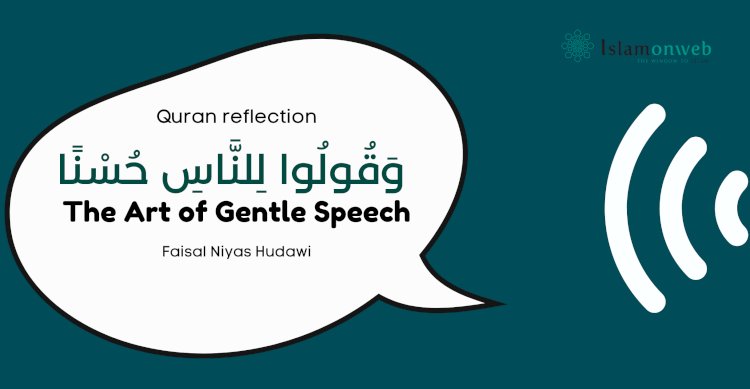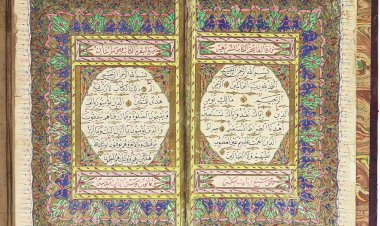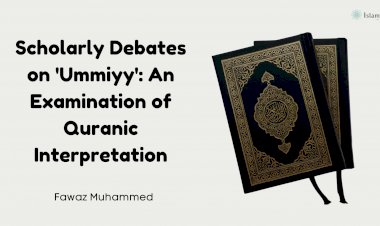وَقُولُوا لِلنَّاسِ حُسْنًا : The Art of Gentle Speech
“And speak kindly to people.” (Surah Al-Baqarah 2:83)
In a world often clouded by harshness and haste, this Divine command calls us to return to a forgotten virtue — kindness in speech. Speaking positively is not just good etiquette; it is an act of worship, a form of charity in Islam. As the Prophet ﷺ said:
“The good word is charity.” (Narrated by Abu Huraira, Sahih al-Bukhari & Muslim)
Words have the power to heal hearts, mend relationships, and spread light. Islam teaches us that every interaction, even a single word, can carry weight on our scales.
Allah likens the good word to a fruit-bearing tree:
كَلِمَةً طَيِّبَةً كَشَجَرَةٍ طَيِّبَةٍ... [إبراهيم: 24-26]
It takes root, it grows, it benefits — just like a kind word that nurtures hearts and uplifts souls.
Today, we reflect on how beautiful speech isn't just about eloquence, but about intent, kindness, and the impact it leaves behind.
A Sign of True Faith and Path to Paradise
وَقُولُوا لِلنَّاسِ حُسْنًا [البقرة: 83]
“And speak kindly to people.” (Surah Al-Baqarah 2:83)
This simple, yet powerful directive, encapsulates the essence of good character in Islam. It is not merely about courtesy but about a spiritual commitment to use our words to uplift, guide, and heal.
The Prophet ﷺ taught that positive speech is a reflection of belief itself. In the hadith:
“Whoever believes in Allah and the Last Day, let him speak good or remain silent.” (Sahih al-Bukhari, Muslim)
Here, the power of the tongue is tied to eternal outcomes — either reward or ruin. Words are never trivial; they weigh heavy on the scale.
The Prophet ﷺ said:
“Indeed, in Paradise there is a chamber whose exterior is visible from its interior, and its interior is visible from its exterior.”
Abū Mūsā al-Ashʿarī asked:
“O Messenger of Allah, for whom is it?”
He ﷺ replied:
“For the one who speaks gently, feeds others, and stands in prayer at night for the sake of Allah while the people are asleep.” (Musnad Ahmad)
The reward for soft, kind words? Not just respect in this world, but lofty ranks in Jannah.
Allah says:
وَهُدُوا إِلَى الطَّيِّبِ مِنَ الْقَوْلِ [الحج: 24]
“They were guided to the good word...” — Good speech is a divine gift, a guidance from Allah, not just a personal trait.
Positive, wise speech has always been a message of the Messengers and a sign of true believers.
Allah commands:
وَقُلْ لِعِبَادِي يَقُولُوا الَّتِي هِيَ أَحْسَنُ إِنَّ الشَّيْطَانَ يَنْزَغُ بَيْنَهُمْ إِنَّ الشَّيْطَانَ كَانَ لِلْإِنْسَانِ عَدُوًّا مُبِينًا [الإسراء: 53].
“And tell My servants to say that which is best. Indeed, Shayṭān sows discord between them. Indeed, Shayṭān is ever to mankind a clear enemy.”
— Surah Al-Isrā’ (17:53)
This verse is a profound command from Allah to His servants to always choose the best and most beautiful words in their speech, as harsh or careless words can become tools for Shayṭān to create enmity and conflict. The verse closes with a reminder that Shayṭān is a clear and evident enemy to mankind, always seeking to cause division and harm.
One word can bring eternal consequences.
The Prophet ﷺ warned:
“A man may speak a word pleasing to Allah without giving it much thought, by which Allah will raise him to degrees. And a man may speak a word displeasing to Allah without giving it much thought, by which he will be cast into Hellfire.” (Sahih al-Bukhari)
The Power of Good Words in Preaching and Interaction
وَقُولُوا لِلنَّاسِ حُسْنًا – "And speak to people kindly" [Al-Baqarah: 83]
In a time where harsh rhetoric and hate-filled sermons are sadly becoming the norm in some circles of daʿwah and public discourse, it is crucial to revisit the Qur’anic command and Prophetic example on the power of good words. The true legacy of Islamic preaching is rooted not in anger or division, but in gentle speech, wisdom, and mercy—qualities that soften hearts and open minds.
Words carry the weight of hearts – they can soften or harden, invite or repel. In the field of daʿwah (calling to Allah), good words are not optional; they are essential tools of success. A single gentle phrase can ignite faith, while harsh speech can turn hearts away. Allah instructed the believers to speak beautifully, and He praised His Prophet ﷺ for embodying this trait:
The Prophet ﷺ’s speech was never harsh or coarse. Allah ﷻ said:
فَبِمَا رَحْمَةٍ مِّنَ اللَّهِ لِنتَ لَهُمْ وَلَوْ كُنتَ فَظًّا غَلِيظَ الْقَلْبِ لَانفَضُّواْ مِنْ حَوْلِكَ
"By the mercy of Allah, you were gentle with them; and had you been harsh or hard-hearted, they would have scattered from around you." [Āl ʿImrān: 159]
Even in Torah, as narrated by ʿAbdullah ibn ʿAmr, the Prophet ﷺ’s noble manners were foretold: “He is not harsh, nor hard-hearted, nor one who raises his voice in the markets. He does not repay evil with evil, but pardons and forgives.”
Allah ﷻ says:
وَمَنْ أَحْسَنُ قَوْلًا مِّمَّن دَعَا إِلَى اللَّهِ وَعَمِلَ صَالِحًا
"Who is better in speech than one who calls to Allah, does righteous deeds, and says, 'Indeed, I am of the Muslims'?" [Fussilat: 33]
And He continues: ادْفَعْ بِالَّتِي هِيَ أَحْسَنُ – “Repel evil with what is better...” [Fussilat: 34]
The Prophet ﷺ never used obscene or foul speech. He said:
"Indeed, Allah does not love foulness or those who speak it." [Sahih al-Tirmidhi]
Abdullah ibn ʿAmr رضي الله عنه said: “The Prophet ﷺ was not obscene or indecent. He said: ‘The best of you are those with the best manners.’”
Anas رضي الله عنه described him: “He was not abusive, nor one who cursed or insulted. When he needed to correct someone, he would say: ‘What is wrong with him? May dust cling to his forehead!’” – a gentle and dignified rebuke.
The Dialogue of Ḥuṣayn al-Khuzāʿī with the Prophet ﷺ
When Ḥuṣayn, a noble of Quraysh, came to confront the Prophet ﷺ about his stance on their idols, the Prophet ﷺ responded with calm reasoning.
He asked: “How many gods do you worship?” Ḥuṣayn replied: “Seven on earth and one in the sky.”
He ﷺ asked: “When trouble befalls you, whom do you call?” He replied: “The One in the sky.”
The Prophet ﷺ said: “Then why do you associate others with Him? O Ḥuṣayn, embrace Islam and you will be safe.”
Ḥuṣayn embraced Islam on the spot, and the Prophet ﷺ honoured him by saying: “Accompany him to his house.”
He entered as an enemy but left as a believer – the victory of gentle, thoughtful words.
Good Words with Even the Harshest
Even with Pharaoh, Allah instructed Mūsā and Hārūn:
فَقُولَا لَهُ قَوْلًا لَّيِّنًا لَّعَلَّهُ يَتَذَكَّرُ أَوْ يَخْشَىٰ
"And speak to him gently, perhaps he may take heed or fear [Allah].” [Ṭā Hā: 44]
When asked whether to return greetings from non-Muslims, Ibn ʿAbbās said: “If even Pharaoh greeted me well, I would return it well.” This is based on Allah’s command:
وَإِذَا حُيِّيتُم بِتَحِيَّةٍ فَحَيُّوا بِأَحْسَنَ مِنْهَا أَوْ رُدُّوهَا
"When greeted with a greeting, respond with better or equal to it." [An-Nisāʾ: 86]
A Bedouin once entered upon Hārūn al-Rashīd, the mighty Abbasid caliph. The Bedouin boldly said,
"O Hārūn!"
The caliph replied, "Yes?"
The Bedouin declared, "I have harsh, severe words for you. Listen to them!"
Hārūn, displaying wisdom and humility, said, "By Allah, I will not listen to them."
The Bedouin asked, "Why not?"
He responded with conviction:
"Because Allah sent one better than you [Mūsā عليه السلام] to one worse than me [Pharaoh], and He said:
فَقُولَا لَهُ قَوْلًا لَيِّنًا لَعَلَّهُ يَتَذَكَّرُ أَوْ يَخْشَى – 'So speak to him gently, that he may take heed or fear.'" [Ṭā Hā: 44]
This encounter beautifully highlights the relevance of gentle speech. If even Pharaoh was to be addressed with kindness, how much more should we use good words with our fellow believers, our family members, neighbours, general public and even those who oppose us.
The Power of Good Words in the Family
وَقُولُوا لِلنَّاسِ حُسْنًا [Al-Baqarah 2:83] – this divine command is not limited to public interaction; it begins at home, where words have the most profound and lasting impact. Indeed, family is the first realm where our words reflect our iman (faith), our character, and our understanding of Islamic adab.
The most deserving recipients of good speech are our parents. Allah ﷻ said:
وَقَضَى رَبُّكَ أَلَّا تَعْبُدُوا إِلَّا إِيَّاهُ وَبِالْوَالِدَيْنِ إِحْسَانًا ... فَلَا تَقُلْ لَهُمَا أُفٍّ وَلَا تَنْهَرْهُمَا وَقُلْ لَهُمَا قَوْلًا كَرِيمًا
[Al-Isra 17:23]
This verse lays out four levels of interaction:
- No bad words: “Do not say to them ‘uff’...”
- No harsh actions: “Do not repel them.”
- Use respectful speech: “Say to them noble words.”
- Show humility: “Lower to them the wing of humility out of mercy…” [Al-Isra 17:24]
After parents, the spouse is most deserving of positive, honouring speech. Allah ﷻ says:
وَقُولُوا لِلنَّاسِ حُسْنًا ﴾ [Al-Baqarah 2:83]
In a hadith narrated by Hakim ibn Mu’awiyah, the Prophet ﷺ was asked about the rights of the wife. He ﷺ said:
“Feed her when you eat, clothe her when you clothe yourself, do not strike her face, do not insult her, and do not boycott her except within the house.”
[Musnad Ahmad | Hasan]
The phrase “do not insult her” is interpreted as not uttering any word of contempt or humiliation.
Reflect also on the affectionate words of the Prophet ﷺ to his wife:
“Ya ‘Aāish! This is Jibril sending you greetings.”
She replied: “Peace and mercy of Allah be upon him.” [Bukhari & Muslim]
Note the gentle nickname “Ya ‘Aāish” – a sign of love and respect. Despite his lofty status, the Prophet ﷺ listened patiently, accepted their words, and never met them with harshness.
Umar ibn al-Khattab رضي الله عنه once said:
“In Makkah, we used to dominate our wives, but when we came to Madinah, we found that the Ansari women had power over their husbands, and our wives began to learn from them. One day, I scolded my wife and she replied back. I said: ‘How dare you reply to me?’ She said: ‘Why not? The wives of the Prophet ﷺ reply to him!’” [Bukhari]
The greatest of men ﷺ was gentle and tolerant within his household – a model for all believers.
Let your words be a garden of love and respect within your home.
Every kind word spoken to parents or spouse is a seed of reward, a bond of love, and a reflection of the prophetic way.
Practical Examples from the Prophet ﷺ
One of the finest real-life examples is what al-Bazzār narrated from Abū Hurayrah (رضي الله عنه):
A Bedouin once came to the Prophet ﷺ seeking his help with something—perhaps in blood money or a need. The Prophet ﷺ gave him something, then asked:
“Have I done good to you?”
The Bedouin replied:
“No, you haven’t.”
This angered some Muslims, and they moved to confront him, but the Prophet ﷺ gestured to them to stop. Then he took the man into his home, gave him more, and asked again:
“Have I done good to you now?”
The man said:
“Yes. May Allah reward you with goodness, and bless your family and tribe.”
The Prophet ﷺ then addressed his companions:
The Messenger of Allah ﷺ said:
“Indeed, my example and the example of this Bedouin is like that of a man who had a camel that ran away from him. People chased after it, but only caused it to run further away. So the owner of the camel called out to them: ‘Leave me alone with my camel, for I am more gentle with it and more knowledgeable about it than you.’ Then he approached it calmly, took some earth from the ground, called it gently, until it came back and knelt down. He tied its saddle and mounted it again.”
He ﷺ added:
“By Allah, had I left you to him after what he said, and you killed him, he would have entered the Fire.” [Al-Bazzār]
This parable beautifully illustrates the wisdom, patience, and gentleness of the Prophet ﷺ in dealing with people—especially those new to Islam or lacking in knowledge. It also highlights the power of kind speech and restraint in guiding others.
This powerful incident reflects how forbearance, patience, and kind speech can guide hearts, turning hostility into affection and guidance.
Another example, Narrated ʿĀ’ishah (may Allah be pleased with her):
"A group from the Jews came to the Messenger of Allah ﷺ and said: ‘As-sām ʿalaykum’ (death be upon you). I understood it and said, ‘And death and the curse of Allah be upon you!’
The Prophet ﷺ said:
‘Calm down, O ʿĀ’ishah, for Allah loves gentleness in all matters.’
I said, ‘O Messenger of Allah, didn’t you hear what they said?’
He ﷺ replied: ‘And I have already said: and upon you.’"
(Sahih al-Bukhari and Muslim)
This ḥadīth beautifully demonstrates the Prophet’s ﷺ forbearance and his commitment to gentleness even when provoked, as well as the importance of measured responses—a lesson in grace, restraint, and moral superiority.
One Word Can Change a Life
Sometimes, a single kind word, spoken at the right moment, can reshape a life, redirect a destiny, and ignite a legacy of good that endures through generations. The story of Zādhān is a striking example.
It is narrated that ‘Abdullāh ibn Mas‘ūd (رضي الله عنه) once passed by a group of young men in Kūfah, indulging in wine and entertainment. Among them was a talented singer named Zādhān, who was enchanting the gathering with his melodious voice. Seeing this scene, Ibn Mas‘ūd simply remarked:
“What a beautiful voice—if only it were used in reciting the Qur’an!”
He then covered his head with his cloak and moved on.
These gentle, non-condemning words pierced Zādhān’s heart.
He asked, “Who was that?”
When he learned it was the Companion of the Prophet ﷺ, he immediately broke his musical instrument, ran after Ibn Mas‘ūd, and repented. Zādhān became one of his dedicated students, learned the Qur’an, and rose to become a renowned scholar, narrating hadith from Ibn Mas‘ūd, Salmān al-Fārisī, and others. His name is found in books of Islamic knowledge and virtue to this day.
SubḥānAllāh! Just one compassionate sentence—“If only this voice was used in the Qur’an”—transformed a life from entertainment and heedlessness to scholarship and piety.
Don’t Underestimate Your Words
This is not the only story. Al-Bukhārī, in his youth, was once present in a lesson of the great scholar Isḥāq ibn Rāhwayh, who said:
“If only someone would compile a book of authentic hadith.”
That simple wish sparked al-Bukhārī’s life mission. He devoted himself to this task and gifted the Ummah with Ṣaḥīḥ al-Bukhārī, the most authentic book after the Qur’an—all beginning with one inspiring comment.
The young Imām al-Shāfiʿī, once praised for his poetic brilliance, was told by a scribe:
“Why don’t you pursue fiqh, O Shāfiʿī?”
That one suggestion awakened his purpose, and he became one of the greatest jurists in history.
Imām al-Dhahabī, known for his works on hadith and Islamic history, was told by his teacher al-Barzalī after seeing his handwriting:
“Your writing resembles that of a muḥaddith!”
Inspired, al-Dhahabī pursued hadith and authored Siyar Aʿlām al-Nubalā’, a priceless treasure of Islamic heritage.
Speak Good. You Never Know.
Dear reader, never belittle a kind, guiding word. It may sow a seed in someone’s heart that blooms into lifelong transformation. Help others discover their strengths, guide them gently to good, and always remember:
“Whoever guides someone to good, will have a reward like the one who does it.”
(Saḥīḥ Muslim)
The power of words is beyond measure. Let us use them for upliftment, encouragement, and calling to Allāh with wisdom and love.
وَقُولُوا لِلنَّاسِ حُسْنًا [البقرة: 83]
“And speak kindly to people.” (Surah Al-Baqarah 2:83)
Disclaimer
The views expressed in this article are the author’s own and do not necessarily mirror Islamonweb’s editorial stance.

























Leave A Comment